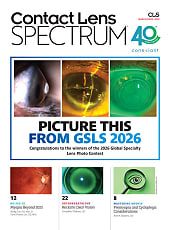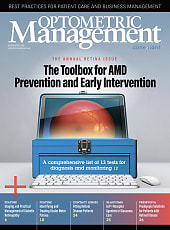Magic happens when science reaches our patients
Recently, I had the incredible experience of attending the Brain and Ocular Nutrition Conference (https://bonconference.org/ ), which is dedicated to the role of nutrition and lifestyle for the eye and brain. Not surprisingly, this research, as presented by nutritional scientists, has uncovered that what is beneficial for the eye and the brain also has a role in promoting overall health, function, and wellbeing — specifically, in addressing areas such as Alzheimer’s disease, diabetes, hypertension, and stroke, among other manifestations of cardiovascular disease.
You can hear my conversations with the researchers on my podcast, "Opt-In with Dr. April Jasper" (visit: spoti.fi/3vOGTP3 ).
CAROTENOIDS AND OMEGAS
I was impressed with the science that was presented and shocked at my lack of proficiency regarding the latest research in these areas. Did you know:
- When taken with carotenoids, omega-3 fatty acids can increase the absorption of the carotenoids and, hence, their effectiveness?
- Carotenoid supplements, when taken with fatty foods (e.g., hamburger and fries) or high-fiber foods (e.g., oatmeal or cereal) bind with those foods, resulting in decreased absorption?
- Eating your veggies raw, as opposed to cooked or blended (as in a smoothie), decreases the body’s absorption of the nutritional components?
- The average amount of omega intake in the American diet is 90 mg, and the minimum recommended amount needed is between 250 mg and 500 mg?
- Omega-3 fatty acids and vitamin E, when taken with carotenoids, result in improvement in objective measures of Alzheimer’s disease severity, as well as memory?
- Lutein, zeaxanthin, and meso-zeaxanthin, when taken together, increase macular pigment and can improve contrast sensitivity within three months?
- In the Alzheimer's study, there were no adverse events seen in any patient who supplemented with carotenoids and omegas?
LIFE-CHANGING INFORMATION
I was overjoyed knowing that the information I heard was going to be life-changing for many. For example, if you are at risk for Alzheimer’s due to a family history and other factors, imagine learning that you now have a proven option to decrease that risk. Or, knowing that if you are at risk for age-related macular degeneration, due to a family history or alreadydecreased macular pigment, you can begin supplementing with carotenoids and omegas now to decrease those odds significantly.
Or, that latest research on floaters: The discovery that the vitreous is not a closed system but an active system full of nutrients, which can get depleted and cause collagen fiber breakdown, resulting in floaters. Evidence shows that vitamin C, when taken orally, reaches the vitreous within four minutes.
MAKING MAGIC
Researchers, scientists, and clinicians must continue to collaborate to identify new areas of study. We can then work together to share the results with colleagues, so that these insights can be used in patient care. This allows us to continue to better our patients’ lives. That’s how we make magic happen for our patients. OM
Email: april.jasper@pentavisionmedia.com
Twitter: @DrAprilJasper
Facebook: @OptometricManagement




